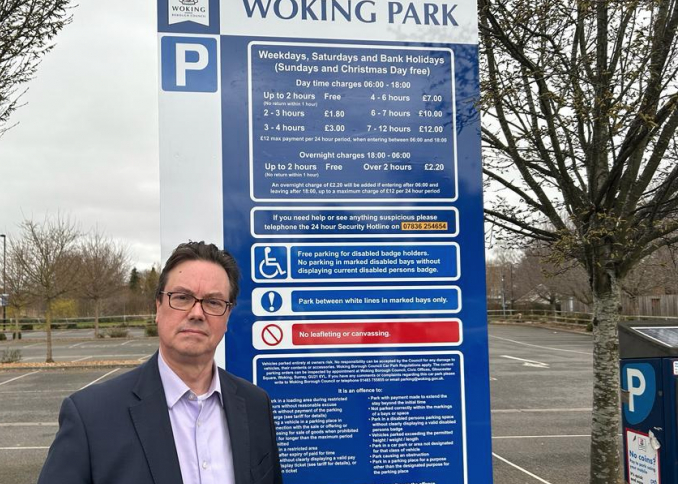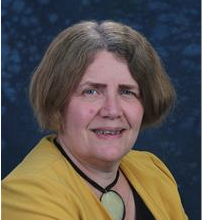 Abraham Lincoln
If given the truth, the people can be depended upon to meet any national crisis...
Abraham Lincoln
If given the truth, the people can be depended upon to meet any national crisis...
 Guildford news...
for Guildford people, brought to you by Guildford reporters - Guildford's own news service
Guildford news...
for Guildford people, brought to you by Guildford reporters - Guildford's own news service
20% Car Parking Charge Hike Planned for Woking
Published on: 11 Jul, 2023
Updated on: 13 Jul, 2023
By Chris Caulfield
local democracy reporter
Parking charges across Woking are budgeted to rise by a “hefty” 20 per cent next year due to the local council’s financial crisis.
The news might be quietly welcomed by GBC councillors given car parking is the borough council’s biggest revenue earner and Guildford competes with Woking to attract shoppers.
Woking Borough Council’s overview scrutiny committee also heard last night that parking charges will then rise a further 10 per cent annually.

As recently as March, Woking’s MP Jonathan Lord was campaigning for parking charges in Woking to be reduced. Image Jonathan Lord’s website
The figures were part of the council’s medium-term financial plan published for the July 10 council meeting as part of its drive to create a balanced budget, bridge its £11 million annual deficit and maximise council tax revenue.
The plan included 14 guiding principles for how the borough council would operate as well as a budgeted assumption that parking charges would rise by 20 per cent in 2024/25 and 10 per cent in each year thereafter.
These, the papers said, would be revised “following receipt of the recommendations of a new parking strategy which is expected in Autumn 2023”.
Cllr Kevin Davis, leader of the Conservative opposition group, said: “On parking income, an absolute favourite for us over the last 15 years or so.”
“But I’m a little dismayed to see that we are anticipating a 20 per cent increase in those parking fees and then 10 per cent a year after.
“They are hefty, 20 per cent is a hefty increase on where we are right now.”
On council tax, the report said that even if it was raised by the maximum permitted without a referendum, 3 per cent, the council’s “spending power will decrease in real terms.”
It added that to do anything “other than maximise potential increases would imperil the council’s ability to sustain statutory services at a reasonable level.”
The report said that it was “unknown whether Government will permit a higher council tax for Woking as has been agreed in other councils suffering financial distress.”
Addressing fears residents had over inflation busting rises to their council tax bill was borough leader, Cllr Ann-Marie Barker.
She said: “This has clearly been a concern, given what has happened in other authorities, but I just wanted to let people know that if council tax does go up by a substantial amount, if we are pushed to that, it will be a concern to people.”
To allay this, she said that 75 percent of people’s council tax currently goes to Surrey County County, and a further 14 per cent to the Police and Crime Commissioner, with 12 per cent to Woking Borough Council, and that it would only be Woking’s share that increased.
She added: “Although no increase is ever going to be something that people want…we are taking at 10 per cent £26.51 and 15 per cent would be £39 for the year, or 76p a week.
“Still not what anybody wants to be doing but not quite as horrific as people think it might be when they look at the whole massive council tax bill that people receive.
The meeting heard from the council’s chief finance officer Brendan Arnold as the numbers “formed a structure within which the council can organise its financial affairs moving forward, and it is particularly important on this occasion because of the financial perils that lie before the council.”
He said: “This is simply a matter of modelling at the moment – we are not making a decision at the moment.
“But we have built in an assumption of 20 per cent and 10 per cent increase and of course the council is due to receive a parking strategy in the autumn that will help inform the final decision the council makes in February.”
The scrutiny committee is set to meet on a monthly basis going forward given the “extraordinary circumstances” the council is in.
There will be two mini budgets set by the council, the first in September, with a second to follow in February. This, Arnold said, was to bring forward any potential savings.
Recent Articles
- Guildford Institute’s Crowdfunding Project for Accessible Toilet in its New Community and Wellbeing Centre
- Letter: Guildford – Another Opportunity Missed?
- Letter: GBC’s Corporate Strategy – Where Is the Ambition?
- My Memories of John Mayall at a Ground-breaking Gig in Guildford Nearly Six Decades Ago
- Westborough HMO Plans ‘Losing the Heart of the Street’ Says Resident
- College Invests to Boost Surrey’s Economy and Close Digital Skills Gap
- Community Lottery Brings Big Wins for Local Charities
- GBC Housing Plan Promises ‘A Vibrant Urban Neighbourhood’ Near Town Centre
- Hospital Pillows ‘Shortage’ at the Royal Surrey
- Updated: Caravans Set Up Camp at Ash Manor School


Search in Site
Media Gallery
Dragon Interview: Local Artist Leaves Her Mark At One of England’s Most Historic Buildings
January 21, 2023 / No Comment / Read MoreDragon Interview: Lib Dem Planning Chair: ‘Current Policy Doesn’t Work for Local People’
January 19, 2023 / No Comment / Read MoreA3 Tunnel in Guildford ‘Necessary’ for New Homes, Says Guildford’s MP
January 10, 2023 / No Comment / Read More‘Madness’ for London Road Scheme to Go Ahead Against ‘Huge Opposition’, Says SCC Leader
January 6, 2023 / No Comment / Read MoreCouncillor’s Son Starts Campaign for More Consultation on North Street Plan
December 30, 2022 / No Comment / Read MoreCounty Council Climbs Down Over London Road Works – Further ‘Engagement’ Period Announced
December 14, 2022 / No Comment / Read MoreDragon Interview: GBC Reaction to the Government’s Expected Decision to Relax Housing Targets
December 7, 2022 / No Comment / Read MoreHow Can Our Town Centre Businesses Recover? Watch the Shop Front Debate
May 18, 2020 / No Comment / Read More











Recent Comments